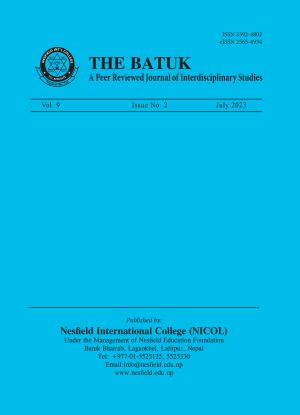Loss and Recovery of ‘Substance’ in Greco-Roman Rhetoric
DOI:
https://doi.org/10.3126/batuk.v9i2.57034Keywords:
classical rhetoric, rhetoricians, substance, knowledge, languageAbstract
This article attempts to delineate the Greco-Roman history of rhetoric in light of the concept of ‘substance’. It examines how Greco-Roman Rhetoric, while traveling from Plato to Aristotle to Cicero to Quintilian, encounters debates and dialogues regarding the issues of essence, meaning, and purpose of rhetoric. Therefore, this article does a qualitative textual analysis of five texts: Phaedrusorgias by Plato (2002, 1864), On Rhetoric by Aristotle (n.d.), Oratory and Orators by Cicero (1875), and Institutio Oratoria by Quintilian (2013). In order to unravel the journey of Greco-Roman rhetorical substance, these texts have been analysed and interpreted from three different points of view: substance in rhetoric/oratory, substance in the language of rhetoric/oratory, and substance in rhetoricians/rhetor/orator. The article concludes that in the history of Greco-Roman rhetoric, Plato nullifies substance, Aristotle adds substance, Cicero amplifies substance, and Quintilian multiplies substance. The article not only tracks the history of Greco-Roman rhetoric from the perspective of substance but also opens new avenues for further research.
Downloads
Downloads
Published
How to Cite
Issue
Section
License
Copyright (c) 2023 Nesfield International College

This work is licensed under a Creative Commons Attribution-NonCommercial 4.0 International License.
This license enables reusers to distribute, remix, adapt, and build upon the material in any medium or format for noncommercial purposes only, and only so long as attribution is given to the creator.




